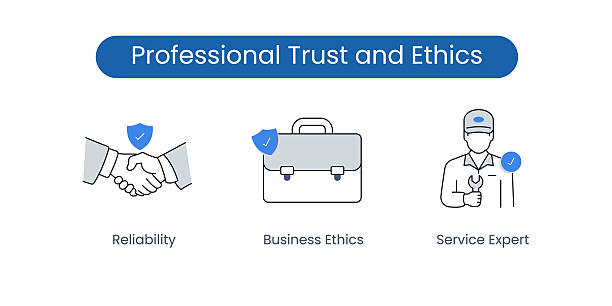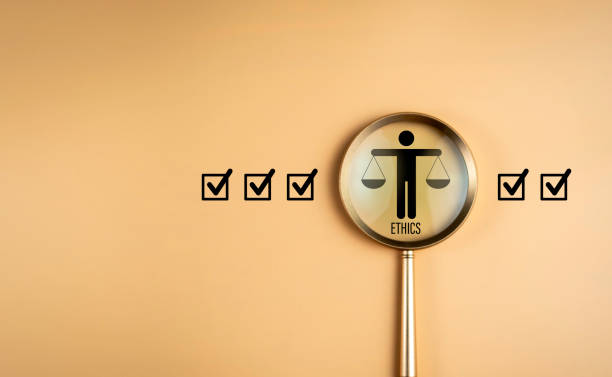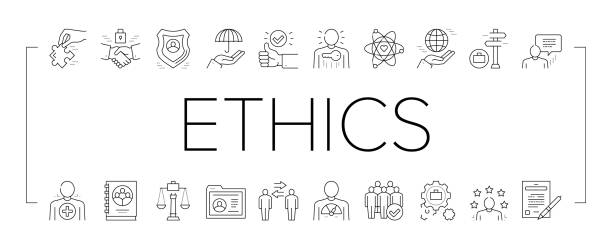In the evolving landscape of accounting education in Ghana, Ethics and Professional Scepticism stand out as cornerstones woven seamlessly into the ICAG curriculum, ensuring that future chartered accountants don’t just crunch numbers but also uphold integrity and question assumptions critically. This article breaks down exactly how these elements are embedded across the syllabus, from foundational concepts to advanced applications, helping students grasp their practical implications. Building on the insights from our guide to the Purpose and Rationale of the ICAG Syllabus Update, which explains the overhaul aimed at aligning with global standards like IFAC and IESBA while addressing Ghana’s economic realities—such as incorporating digital tools, sustainability, and competency-based learning—this piece zooms in on how ethics and professional scepticism fortify that framework, turning theoretical updates into ethical muscle for real-world practice.
Ethics and Professional Scepticism: Foundations in the Knowledge Level

Right off the bat, the ICAG syllabus plants the seeds of ethics and professional scepticism at the Knowledge Level, where everything starts with building a solid base. This level includes four subjects: Financial Accounting, Business Management and Information Systems, Business and Corporate Law, and Introduction to Cost & Management Accounting. Ethics isn’t tacked on as an afterthought; it’s baked into the learning outcomes, often drawing from the IESBA Code of Ethics for Professional Accountants and the ICAG’s own code.
Take Financial Accounting, for instance. Students learn to explain the need for ethical behavior when maintaining records and preparing statements. The syllabus allocates about 5% of the content to ethics, covering the context, purpose, and qualitative characteristics of financial information alongside ethical principles. You’re expected to recognize that judgment plays a huge role in applying fundamental concepts, and that’s where professional scepticism kicks in—questioning whether data sources are reliable or if there’s bias lurking in the numbers. A quote from the syllabus puts it plainly: “Students will learn about the IESBA Code of Ethics for Professional Accountants – fundamental principles and the ICAG Code of Ethics and consider the merits of a principles-based code.”
Shifting to Business and Corporate Law, ethics underpins discussions on governance, bribery, corruption, and conflicts of interest. Learning outcomes push you to explain and apply ethical principles to business problems, like spotting insider dealing or breaches of confidentiality. Professional scepticism here means not taking legal frameworks at face value but evaluating their implications in Ghanaian contexts, perhaps in scenarios involving public sector tenders or corporate mergers. It’s all about fostering an inquiring mind early on, so by the end of this level, you’ve got a general knowledge base that’s not just theoretical but ethically attuned.
In Business Management and Information Systems, the integration gets techy. Ethics appears in entity types, purposes, and the impact of technology on accountants. You might analyze how data privacy laws tie into ethical decision-making, exercising scepticism when assessing AI-driven systems for potential biases. Introduction to Cost & Management Accounting rounds it out by emphasizing integrity in preparing management info. Outcomes include using professional scepticism to judge if figures are reasonable—say, in budgeting for a manufacturing firm in Accra. This level’s approach ensures ethics and professional scepticism aren’t isolated; they’re threads connecting subjects, preparing you for tougher applications ahead.
Transitioning smoothly, this foundational embedding sets the stage for deeper dives, where theory turns into practice. Students often find that platforms like knowsia, with their AI-powered question banks, help simulate these ethical dilemmas, making prep feel less daunting and more interactive.
Ethics and Professional Scepticism in Application Level: Practical Scenarios

As you climb to the Application Level, ethics and professional scepticism ramp up, shifting from identification to real-world application in six subjects: Financial Reporting, Management Accounting, Audit and Assurance, Financial Management, Public Sector Accounting and Finance, and Principles of Taxation. Here, the syllabus demands a working knowledge, where you apply concepts in straightforward situations while flagging complex issues for expert input.
Financial Reporting exemplifies this. Ethical thinking is examined in regulatory frameworks, with a mandate to maintain an ethical mindset across all areas. The syllabus notes: “Ethical thinking is fundamental to the practice of accounting. The ability to identify and explain ethical issues will be examined specifically in syllabus area A ‘Regulatory, ethical and legal frameworks’. In addition, an ethical mindset will be expected when students are answering questions on all other syllabus areas, along with the exercise of professional scepticism and judgement.” So, when preparing consolidated statements, you might question aggressive revenue recognition tactics, applying IESBA principles to avoid misrepresentation.
Audit and Assurance takes it further, allocating 15% to regulatory, professional, and ethical issues. Professional scepticism is core to conducting effective audits—think challenging management’s assertions on inventory valuations in a retail chain. Learning outcomes require demonstrating ethical thinking, like recommending safeguards against threats to independence. It’s not passive; you’re actively justifying actions in scenarios mirroring Ghana’s audit landscape, where public trust is paramount.
In Financial Management, ethics influences financing options and risk management. The syllabus stresses: “Underlying ethical thinking is a critical skill in the identification of financing options, the management of financial risk and making investment decisions. Financial management includes consideration of the impact of decisions on all stakeholders, including the ethical implications.” Professional scepticism comes into play when evaluating investment proposals, perhaps doubting overly optimistic projections in a volatile economy.
Public Sector Accounting and Finance embeds ethics in an environment vital for credibility. Specific outcomes include assessing ethical issues in bodies like the Economic & Organised Crime Office or the Public Accounts Committee, using scepticism to review offences and penalties. The syllabus insists on an ethical mindset everywhere, aware of judgement needs in public fund handling.
Principles of Taxation highlights ethics in tax practice, covering dilemmas like money laundering, tax avoidance versus evasion, and conflicts of interest. Students must exercise professional scepticism with data sources, recognizing non-compliance implications. Ethics can pop up in any question, making it a constant undercurrent.
Management Accounting integrates these through cost analysis and performance measurement, where ethical behavior ensures unbiased reporting. Overall, this level’s integration builds competency, linking back to Knowledge while previewing Professional challenges. And hey, if you’re juggling this with work, knowsia past questions and expert content can sharpen your scepticism without the burnout.
Embedding Ethics and Professional Scepticism at the Professional Level

At the pinnacle, the Professional Level demands discerning judgement and critical evaluation in four subjects: Corporate Reporting, Advanced Audit and Assurance, Advanced Taxation, and Strategic Case Study. Here, ethics and professional scepticism are not just tools but essential for providing high-level advice in ambiguous scenarios.
Corporate Reporting expands ethics to include social responsibility, sustainability, and environmental matters. Students resolve dilemmas in any question, justifying scepticism in sectors like mining or agriculture in Ghana. The syllabus states: “At the professional level, students will be expected to demonstrate the higher skills of discerning business judgement and critical evaluation. They will be expected to demonstrate and justify the exercise of professional scepticism whatever the nature and sector of their professional work.”
Advanced Audit and Assurance deepens this, with outcomes for identifying ethical issues and recommending safeguards. Professional scepticism is key in risk assessments, perhaps questioning fraud indicators in financial statements. It’s about mitigating threats while upholding IESBA standards.
In Advanced Taxation, ethics takes priority in tax planning. The syllabus emphasizes: “Ethical issues should have high priority in tax-related matters. This is reflected in the fact that ethical behaviours are included as an important part of the tax planning area of the syllabus. Over and above that, students will be expected to apply ethical principles as they relate to all other areas of the syllabus, recognizing and explaining the issues arising, recognizing bias, making appropriate judgements and exercising professional scepticism.”
The Strategic Case Study ties it all together, integrating ethics with business trust. Candidates evaluate scenarios involving sustainability, dealing with bias and recommending solutions to dilemmas. Professional scepticism shines in analyzing complex data and stakeholder impacts.
This level’s approach ensures graduates are ethically robust, ready for leadership. Continuity from lower levels makes the progression logical, reinforcing that ethics isn’t optional—it’s the glue holding professional practice together.
How ICAG Assessments Test Ethics and Professional Scepticism

Assessments in ICAG aren’t just about right answers; they rigorously test ethics and professional scepticism, aligning with the syllabus’s embedded nature. Remember those ICAG Assessments: Format, Pass Marks, and Progression Rules? They play out here through varied formats—MCQs at Knowledge for basic ethical recall, scenario-based questions at Application for application, and case studies at Professional for judgement.
In exams, ethics can emerge unexpectedly. For Audit and Assurance, you might face a dilemma on auditor independence, requiring scepticism to challenge evidence. Markers look for justified reasoning, per syllabus guidelines: “Students will be expected to apply professional scepticism and judgement when making decisions.” Pass marks hover at 50%, but partial credits reward ethical insight even if calculations falter.
Computer-based exams, rolling out from 2025, incorporate ethics via simulations, testing real-time scepticism. Progression rules ensure you master ethics level by level—no exemptions for Professional papers, where scepticism peaks. This ties into broader competency, as IFAC standards demand.
Challenges arise when students overlook ethics in technical questions, but benefits include building trust in Ghana’s markets. Prep tip: Use resources to practice, turning assessments into ethical proving grounds.
Challenges in Integrating Ethics and Professional Scepticism

Integrating ethics and professional scepticism isn’t without hurdles. One biggie is balancing technical depth with ethical nuance—students sometimes prioritize formulas over dilemmas, leading to superficial answers. In Ghana’s context, cultural norms might clash with IESBA principles, like navigating gift-giving in business without breaching independence.
Professional scepticism demands practice; it’s easy to accept data at face value under exam pressure. The syllabus counters this by embedding it everywhere, but real-world application post-qualification can vary, especially in high-stakes audits where bias creeps in.
Yet, these challenges yield benefits. Graduates emerge resilient, capable of ethical leadership amid scandals or economic shifts. ICAG’s approach, per the update, fosters lifelong learning, aligning with global demands.
Benefits of Ethics and Professional Scepticism in ICAG Training

The perks of this integration are massive. First, it cultivates trustworthy professionals, boosting Ghana’s financial integrity. Ethics and professional scepticism enhance decision-making, reducing risks like fraud in public sectors.
Students gain a competitive edge—employers value sceptics who question assumptions, leading to better audits and tax advice. Sustainability focus prepares for emerging issues, like ESG reporting.
On a personal level, it builds confidence; knowing you can handle dilemmas ethically is empowering. Transition words aside, this integration isn’t static—it’s dynamic, evolving with standards.
Future Trends in Ethics and Professional Scepticism for ICAG

Looking ahead to 2029 and beyond, ICAG’s syllabus will likely amplify ethics and professional scepticism with AI and climate risks. Expect more on digital ethics, like data manipulation in blockchain accounting.
Global alignments with IESBA updates could introduce nuanced scepticism in virtual audits. Continuous assessment might emerge, blending ethics into portfolios.
For students, staying ahead means engaging communities—perhaps teaching on Knowsia to reinforce concepts while earning. This forward tilt ensures ICAG pros remain ethical vanguards.
Conclusion: Embracing Ethics and Professional Scepticism for Ethical Excellence

In sum, the ICAG syllabus masterfully integrates ethics and professional scepticism, from Knowledge basics to Professional pinnacles, creating accountants who think critically and act integrity-first. This not only meets IFAC and IESBA benchmarks but equips you for Ghana’s challenges. As the update rationale underscores, it’s about relevance—dive in, practice diligently, and you’ll thrive. Whether learning or sharing on platforms like Knowsia, remember: ethics isn’t a checkbox; it’s your professional superpower.

